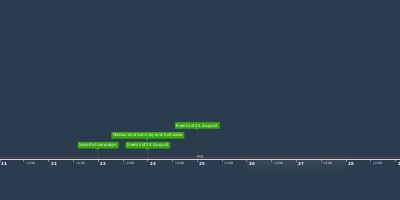Deri-Kher campaign (4 marzo 1918 anni – 16 marzo 1918 anni)
Descrizione:
The 1st Battalion of the 55th Coke’s Rifles (Frontier Force), commanded by Lieutenant Colonel H.E. Herdon, de-trained at Deri Ghazi Khan on 4th March 1918. The four rifle companies were class-composed of: Dogras, Sikhs, Punjabi Mussulmans and Pathans; the Pathan company was half Yusufzais and half Khattacks. Colonel Herdon was ordered to move to Fort Munro, 90 kilometres away and on top of a 1,800 metre-high escarpment; the battalion departed on 5th March. The following day news was received of an impending attack on Fort Bhar Khan, 100 kilometres distant. Colonel Herdon marched towards Fort Bhar Khan with half of his battalion but after travelling 16 kilometres further news was received that the Fort Bhar Khan garrison had escaped to Kher. Colonel Herdon now set his compass towards Kher, and by marching through a pitch-black night accompanied by heavy rain and mist his half-battalion reached Kher at 0130 hours on 7th March. The men had no greatcoats or blankets and no food was available, whilst the only huts there were fire-damaged. On the next day the other half of Coke’s Rifles reached Kher, and a rudimentary supply line was established. Over the next few days the battalion picqueted the roads to Girdo and Rakhni.On 15th March around 3,000 Marris and Khetranis, mostly swordsmen, attacked Fort Munro. Coke’s Rifles marched hard to get there in time, accompanied by Centre Section (2 guns) of 23rd (Peshawar) Mountain Battery. The tribesmen got into some bungalows near the fort and occupied an adjacent hill. Centre Section was commanded by Captain T.F. Hennessy and he provided fire support, firing 32 rounds at 1550 metres range whilst two companies of Coke’s Rifles attacked and dispersed the enemy. Coke’s Rifles had four men wounded, one mortally, by sword cuts.
The next day more troops arrived and the Force moved to Rakhni from where punitive columns destroyed villages, cut crops, seized cattle and took many prisoners. The 12th Pioneers, commanded by Lieutenant Colonel J.S. Hooker, supported the infantry by road and camel-track construction, and often by accompanying columns to use pioneer expertise in demolishing villages. The region was dry and very hot by day, but the temperature dropped to freezing conditions by night.
Aggiunto al nastro di tempo:
Data:
4 marzo 1918 anni
16 marzo 1918 anni
~ 12 days
